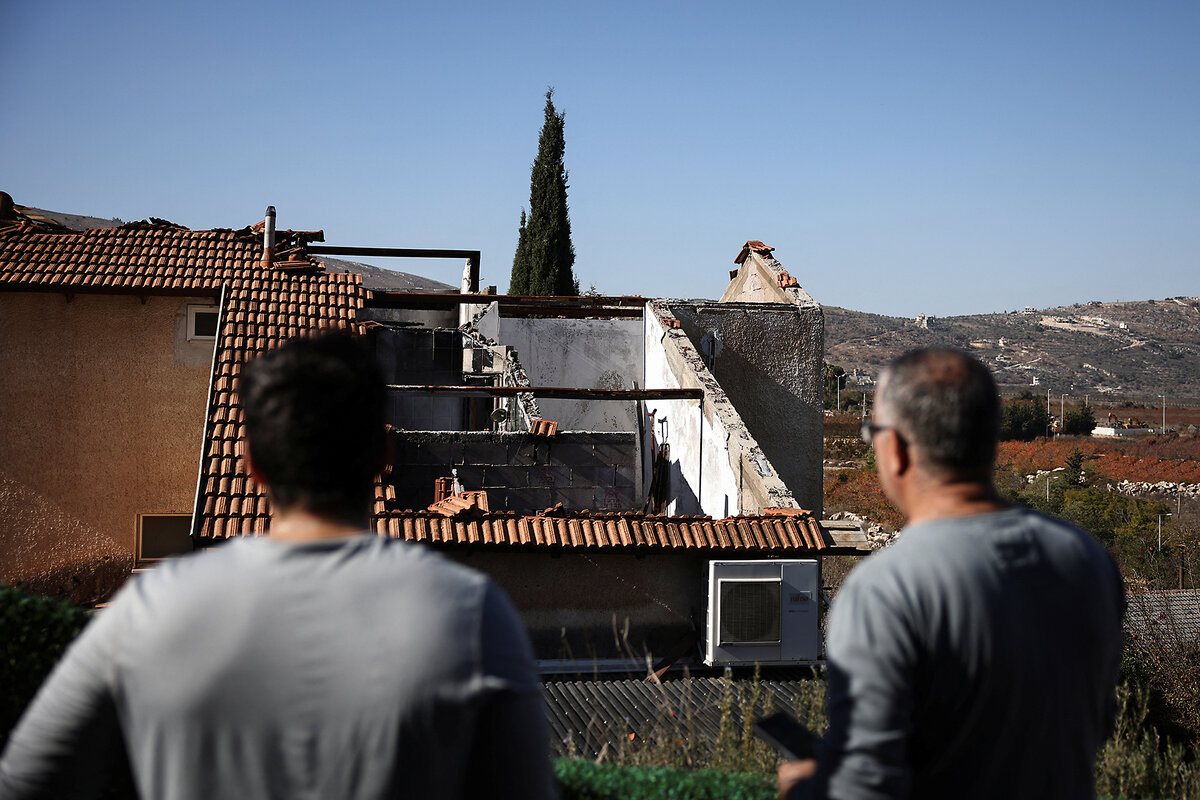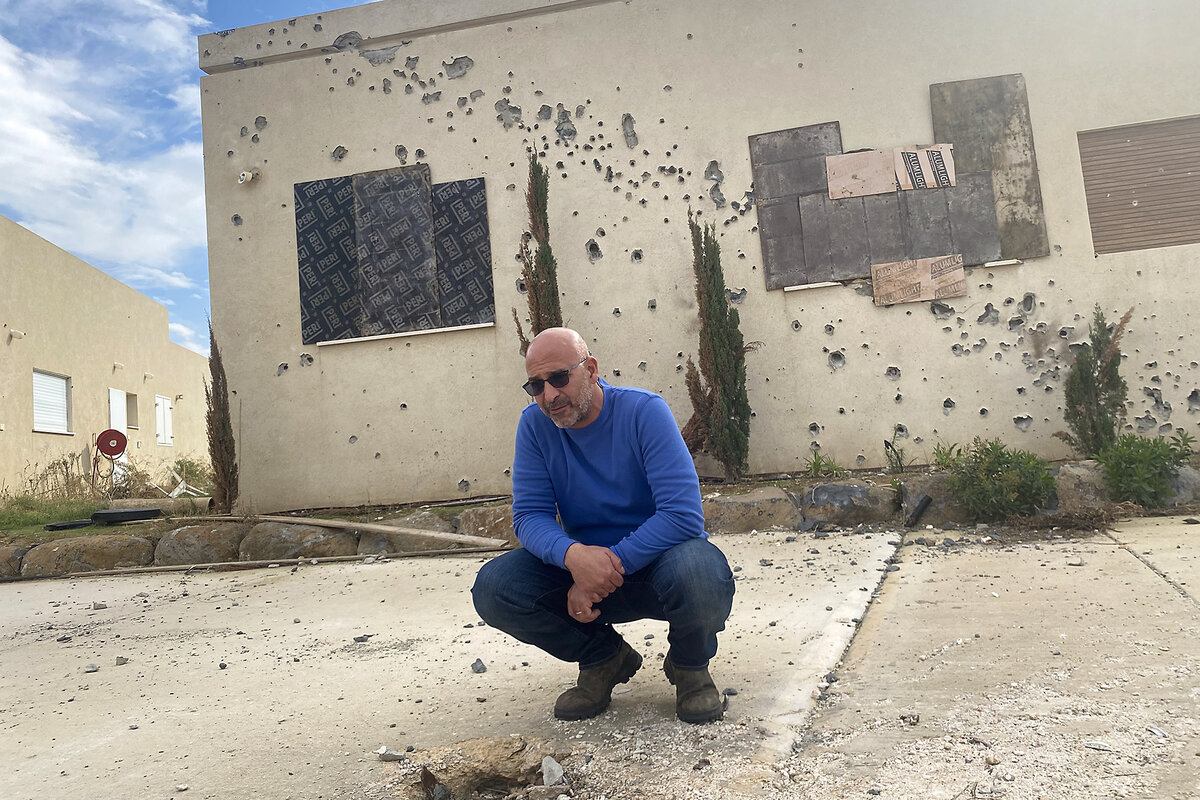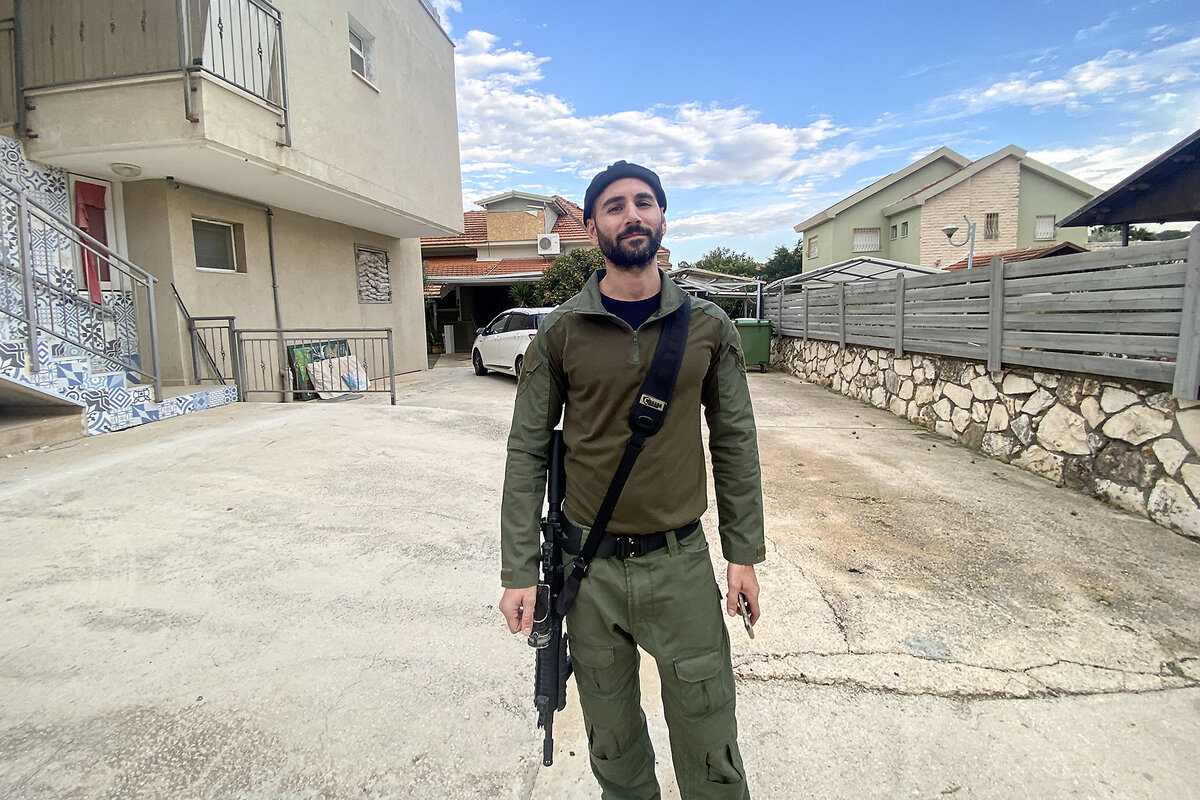Time to go home? Hezbollah ceasefire offers northern Israelis hope.
Loading...
| Kibbutz Dafna, Israel
Orit Praag is so delighted by the ceasefire between Israel and Hezbollah that she’s almost bouncing as she walks along the lavender and rosemary bushes in the garden of her son’s home.
His family has not lived here on this kibbutz near Lebanon for the past 14 months.
Along with some 60,000 other residents in villages and towns along Israel’s northern border, they left the day the community was awoken by evacuation orders. The region became a second war front a day after the Oct. 7, 2023, assault on Israel’s southern border from Gaza, when Hezbollah opened fire in solidarity with Hamas.
Why We Wrote This
Northern Israel offered residents a relaxed, pastoral refuge away from the country’s crowded center. Now a ceasefire with Hezbollah, bolstered perhaps by the fall of Syria’s government, offers hope that northerners displaced by war can return home.
Since then, a Hezbollah missile landed on the sidewalk next door, shattering windows and leaving the walls of all the nearby houses riddled with shrapnel. Kibbutz Dafna’s avocado grove was destroyed by a fire, the roof of its school struck, and thousands of missiles and drones were shot toward the community and points deeper in Israel.
But residents say they hope the ceasefire means they will return to this communal farm that is nestled in the Hula Valley. A ridge of Lebanese hills marks the border about a mile away.
Ms. Praag's family, like so many of the other evacuees from kibbutzim and towns along the northern border, remains torn, awaiting clarity to the question they’ve debated every day since their abrupt departure: Will it be safe enough to return?
“I admit I’m feeling optimistic right now,” she says. “The ceasefire has created positive feelings and hope. I could see that this past weekend, seeing so many young families arrive to visit their homes and sleep over. My grandson even made a video about the kibbutz for his classmates, declaring, ‘This is my home.’”
Syria’s impact
According to the ceasefire brokered by the United States and France two weeks ago, Hezbollah forces must retreat 18 miles north of the border within 60 days while Israeli troops withdraw from southern Lebanon, to be replaced by Lebanese and United Nations troops. Then tens of thousands of Lebanese and Israeli civilians from both sides of the border are allowed to return home.
Buoying hopes, the dramatic fall over the weekend of the autocratic Assad regime to rebel forces in Syria increases the likelihood the truce holds, some Israeli military officials believe. The regime’s abandonment by its longtime sponsor Iran signals Tehran’s diminished power and ability to easily resupply Hezbollah in Lebanon.
Dafna and other northern communities historically were seen as among the most threatened in Israel. In the Jewish state’s earlier years, the kibbutz was targeted by Syria and later by militant groups in Lebanon.
But the communities had never been evacuated, even amid the fierce Lebanon wars in 1982 and 2006. The question of returning is also symbolic, a test of the Zionist ethos of defending borders through settlement.
Ms. Praag’s parents’ generation founded Kibbutz Dafna as young refugees from Nazi Europe. The northern Galilee, ringed by Syrian and Lebanese hills and under the gaze of towering Mount Hermon in the northern Golan Heights, is beloved for its fresh air, pastoral views, and relaxed pace far from Israel’s crowded center.
“I was born here, and this is home to me, with these views and the sound of nearby rivers,” says Ms. Praag. “Since I was in nursery school I heard the Syrians around me, threatening us in those days, but I knew that Israel would save me.”
Now, referencing the 100 Israelis still held hostage in Gaza, and an Israeli government that she and others criticize for not acting more urgently to negotiate their release, she wonders what would happen if Hezbollah captured her or her neighbors.
Hamas’ mass hostage-taking is a plan reportedly modeled on one by Hezbollah.
“We were used to having security incidents, but nothing prepared us for what happened on Oct. 7, and what happened that day could have happened here,” says Ravit Rosental, principal of the kibbutz middle school and high school. “I won’t feel safe until the hostages return.”
“It’s a crazy reality”
Arik Yaacovi, the kibbutz manager, says the trauma is so deep, “It will take a generation for a sense of security to return.”
Especially dangerous to border communities is the firing of anti-tank missiles directly onto homes. That threat has been curbed, as has the risk of infiltrations, he says, thanks to the massive Israeli offensive that began in September and included the first ground invasion of southern Lebanon since 2006.
Israeli forces uprooted Hezbollah tunnels and lookouts, and airstrikes killed much of Hezbollah’s top leadership, including its storied leader, Hassan Nasrallah. Yet the threat of ballistic missiles remains.
“I’ve lived in this area almost 50 years and have experienced how we go from round of fighting to round of fighting. ... It’s a crazy reality. No one wants to raise their children like this,” Mr. Yaacovi says.
“What will make the difference in people feeling safe is the beefing up of security arrangements, including the kibbutz fence, and how extensively the army will be deployed along the border,” he continues. “But we have no other country, and woe to us if we surrender. It’s an essential part of the country.”
When the kibbutz, whose main income is from tourism and avocado and citrus groves, evacuated its 1,050 residents, they scattered across the country and even abroad. Many are staying at hotels and apartments paid for by the government near the Sea of Galilee.
Often in the same families, partners disagree over where they should cast their future. Ms. Rosental, the school principal, reports a spike in anxiety and other emotional problems among the students, with parents too emotionally spent to address them.
As the fighting ramped up in September, with daily missile barrages on the entire north, people were terrified of driving, fearing they’d be caught on the roads without shelter.
Yet if the ceasefire holds, Mr. Yaacovi says, and a new sense of normalcy replaces the dread from the sirens and booms of air defense systems intercepting rockets overhead, he has an optimistic assessment: “By this summer, I hope we will see most people moved back.”
“My heart definitely wants to come back”
Five miles west of Dafna is the working-class city of Kiryat Shmona. Today it feels like a ghost town, its businesses shuttered and playgrounds and streets empty.
On the second floor of a building where three generations of Achi Natan’s family live, a children’s room lies in tatters from a missile.
Mr. Natan, a musician doing his military reserve duty in the local security force, says he will never leave this place that his family has called home for decades.
He was named for his father’s brother, who was killed fighting in the 1982 war. Yet he expects, regardless of what this ceasefire brings, that his sons and grandsons will also have to fight in Lebanon.
At the site of a direct missile hit on a shed that lit an adjacent apartment block ablaze, the smell of smoke still lingers four months later.
Yotam Degani, Kiryat Shmona’s director of resource development, looks beyond the damaged buildings, motioning to the surrounding nature.
“I’m biased, but this is the most beautiful place in Israel. It’s a real community in Kiryat Shmona. When you live here, you are living as a family,” he says.
“My heart definitely wants to come back,” he adds, pausing. He explains that his wife is hesitant about bringing their baby daughter and toddler son here. “There has not been a day we have not talked about it, cried about it – it’s complicated.”
The night before, though, he slept in his own bed for the first time in six months. “It feels like home; it’s magical – the place I want to come back to.”











